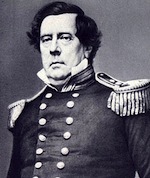PERRY, COMMODORE MATTHEW [CALBRAITH] (1794-1858). Commodore Matthew Perry served a long and distinguished career in the U.S. Navy, which began in January 1809, when he was commissioned as a midshipman. Perry is best known for commanding an 1853 expedition of four vessels, including the steam frigates Mississippi (built 1841) and Susquehanna (built 1850), on a mission to break Japanese isolationism and secure trading privileges for the United States. A return to Japan the following year, with a larger military force, formally secured these privileges on 31 March 1854 by the Treaty of Kanagawa. In Chapter 24 of Moby-Dick (1851), Herman Melville alludes briefly to the isolationism of Japan, believing that when Japan becomes open to trade, a whaleship should receive the credit.
Perry and his Japanese expedition inspired widespread patriotism and a greater interest in Asia. The John Luther Long story Madame Butterfly (1898), the David Belasco play Madame Butterfly (first perf. 1900), and the Giacomo Puccini opera Madama Butterfly (first perf. 1904) explore the potentially tragic implications of cultural conflict in eighteenth-century Japan. Perry’s 1853 mission provides the setting for the Steven Sondheim/David Prince production of Pacific Overtures (first perf. 1976), a moderately successful Broadway musical chronicling the social changes resulting from the American incursion. Perry documented his experiences in Narrative of the Expedition of an American Squadron to the China Seas and Japan. Performed in the Years 1852, 1853 and 1854 [Under the Command of Commodore M. C. Perry, United States Navy) by Order of the Government of the United States] (1856).
Narrative of the expedition of an American squadron… (1856)
keywords: white, male

